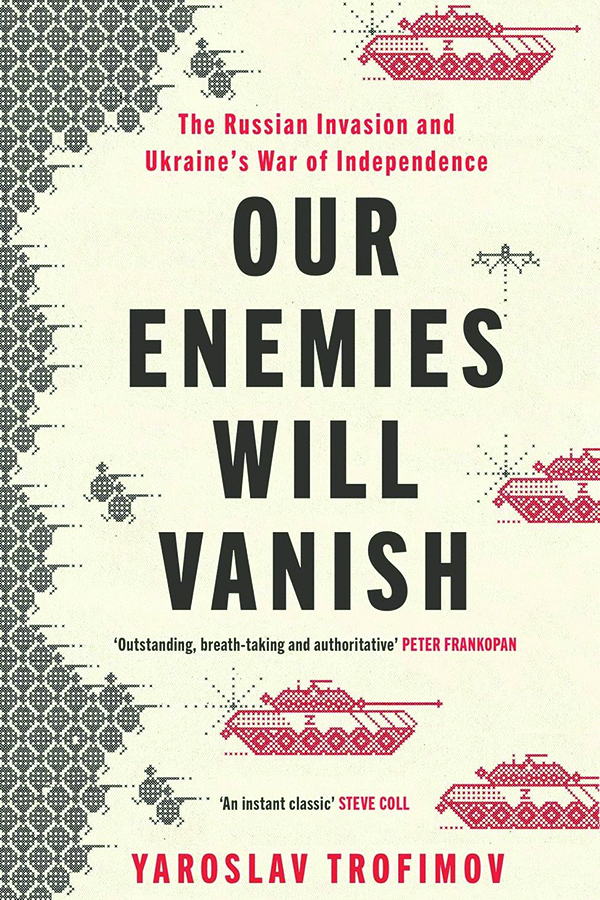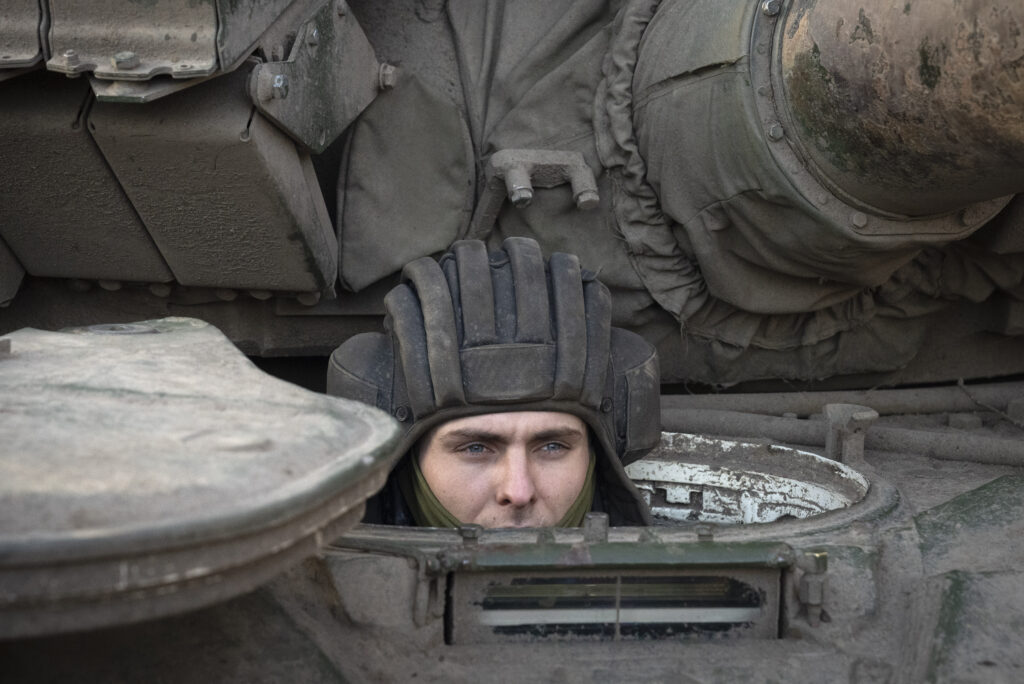“Russian warship, go f*** yourself!” swiftly became a rallying cry through war-stricken Ukraine in early 2022, after Russia launched an unprovoked invasion of its disobedient neighbor. The phrase, which originated with an outnumbered but defiant group of Ukrainian sailors on Snake Island in the Crimean Sea who dared their Russian counterparts to capture them dead or alive, became an entire nation’s slogan of resistance against an avaricious foe determined to extinguish its independence.

This attitude of audacity in the face of overwhelming force animates Our Enemies Will Vanish, Yaroslav Trofimov’s riveting, lyrical account of the first year of the devastating Russo-Ukrainian war, now entering its third. The Wall Street Journal’s chief war correspondent, Trofimov interweaves a narration of his hopscotching across his native Ukraine to report on the outbreak and aftermath of the invasion with a broader analysis of the fighting spirit of the beleaguered, inspiring Ukrainian people.
Trofimov begins with a brisk retelling of Ukraine’s tortured history of entanglement with its larger neighbor, focusing on watershed moments like 2004’s Orange Revolution and 2014’s Maidan Revolution. “Internal strife has repeatedly caused national catastrophes throughout Ukrainian history,” Trofimov wrote, “as political rivals engaged in petty intrigues and sought foreign help, forfeiting the country’s independence.” After Maidan, “little green men” — that is, nonuniformed Russian troops and associated mercenaries — seized the Crimean Peninsula and portions of eastern Ukraine under the guise of protecting Russian-speaking minorities in those regions. A costly but low-intensity war ensued for nearly a decade, leading to a stalemate.
Into this breach stepped Vladimir Putin in February 2022, whose army threatened to swamp Ukrainian defenses entirely in the earliest days. Moscow invaded northward from Crimea, westward from the Donbas, and southward from the Russian border, aiming to capture Kyiv, where Trofimov had holed up, in a lightning strike. Countries across the Western world steeled themselves for Ukraine’s collapse, urging its president, Volodymyr Zelensky, to negotiate a surrender with Putin.
But the seeming weakness of Ukrainian forces was a carefully concealed ruse, Trofimov reveals. “I was afraid we would lose the element of surprise,” said Valeriy Zaluzhny, the Ukrainian commander in chief who has recently been relieved of his duties. “We needed the adversary to think that we are all deployed in our usual bases, smoking grass, watching TV, and posting on Facebook.” Surprisingly well-trained Ukrainian troops stymied their adversaries’ advance, buying precious time for the beleaguered country to recover its equilibrium.
Just a few weeks in, the Russians grudgingly realized they were in for a real fight. “It looks like the leadership has now realized that war with the so-called Ukraine won’t be a walk in the park,” Igor Girkin, a former FSB colonel and former minister of defense of the ersatz Donetsk “People’s Republic,” said at the time. Ukraine’s leader, having withstood the initial incursion, sounded cautiously optimistic notes in early March. “We’re not afraid of anyone,” Zelensky told journalists, following troop exercises. “There is no panic. Everything is under control. It’s important that we are prepared, and we are.”

One prominent example can be found in the tiny hamlet of Bilohorivka, which hugs the shore of the Donets River and sits at a strategic crossroads just outside of Kremlin control in the eastern Luhansk province. Russians dispatched tanks, armored vehicles, and pontoon bridges with naval support to cross the river but failed nine times in the face of outnumbered Ukrainian troops. By the time they’d abandoned their plans, Putin’s forces had lost more than 100 tanks, artillery pieces, and fighting vehicles, hundreds of enlisted troops, and a colonel.
Doughty Ukrainian soldiers received much-needed support from everyday Ukrainians, on the battlefield and off. After Russian armored vehicles had been routed from Kyiv’s suburbs, one local man recorded a sardonic video. “Burn in hell,” he intoned. “They’ve come here and now look at what is left of them — just spare parts.” In Kherson, which Russian forces had occupied, thousands of townspeople gathered on the main square on a daily basis, waving their country’s flag. Months later, the city would be liberated.
Western arms, delivered fitfully and with great trepidation, played a critical role in turning the tide in the summer of 2022. Indeed, concerns that Putin would escalate in response to the airlifts have repeatedly proven false. “Every time the United States decided to step up its involvement,” Trofimov asserted, “Moscow responded with only bluster and empty promises to destroy Western weapons convoys the moment they entered Ukraine.” In particular, the highly accurate American-made High Mobility Artillery Rocket System was a tactical game-changer, enabling Ukrainian forces to shred the Russian lines from as far away as 50 miles.
In July, Trofimov interviewed Zelensky in the presidential enclave in Kyiv. The haggard, visibly aged president revealed the anguish he felt at battlefield losses and civilian slaughter. Yet he had no alternative to continuing to fight. “We would prefer to de-occupy in a way that is not by military means and to save lives,” he said. “But we are dealing with who we are dealing with. Until they get smashed in the face, they won’t understand anything.”
The face-smashing extended into the fall and winter, as Ukrainian divisions recaptured key towns in Luhansk, such as Izyum, Terny, and Lyman, and, eventually, Kherson in the south. These triumphs prompted celebrations featuring the national anthem and its promise that “our enemies will vanish,” the origin of the book’s title. They didn’t, of course, and uncertainty reigned even in the face of Kyiv’s victories. One woman Trofimov interviewed in the recently liberated northern village of Yatskivka refused to share her name. “If the Russians come back, they could execute me for talking to you,” she said. Still, by the first anniversary of the outbreak of the war, Trofimov reckoned that, while the country’s borders remained in flux, it was evident that “Ukraine has won the war for its independence.
Along the way, Trofimov also explodes certain narratives. He reported that in the war’s early days, Zelensky didn’t actually tell European leaders, in response to their imploring him to flee his country, “I need ammo, not a ride.” The leaders of the controversial Azov forces indeed had disturbing neo-Nazi connections, but the unit has since grown from battalion to regiment, become integrated into the Ukrainian National Guard, and received substantial funding from Jewish billionaire Ihor Kolomoisky. And the Poles, long hostile to their eastern neighbors, welcomed fleeing Ukrainians with open arms. A Polish-language poster in a Krakow coffee shop read, “Ukrainian soldiers are defending your nation.” And Ukrainian leaders were indeed poised to reach an accommodation with Russia, following direct talks in Istanbul in late March 2022 — that is, until the revelation of Russian war crimes in Bucha, a Kyiv exurb, including the execution and dismemberment of the bodies of hundreds of civilians.
CLICK HERE TO READ MORE FROM THE WASHINGTON EXAMINER
Our Enemies Will Vanish concludes with a brisk coda that sweeps through the developments of 2023, including the much heralded but mostly unsuccessful Ukrainian counteroffensive. As an apparent stalemate has set in, amid the dwindling of Kyiv’s forces and munitions and swelling opposition in the U.S. Congress to a replenishment of funding for the war effort, the situation has become grim.
The Ukrainians soldier on for now. “We are afraid, very afraid,” a mother in the besieged city of Severodonetsk told Trofimov in mid-2022. “But we still hope for the best.”
Michael M. Rosen is an attorney and writer in Israel and a nonresident senior fellow at the American Enterprise Institute.
